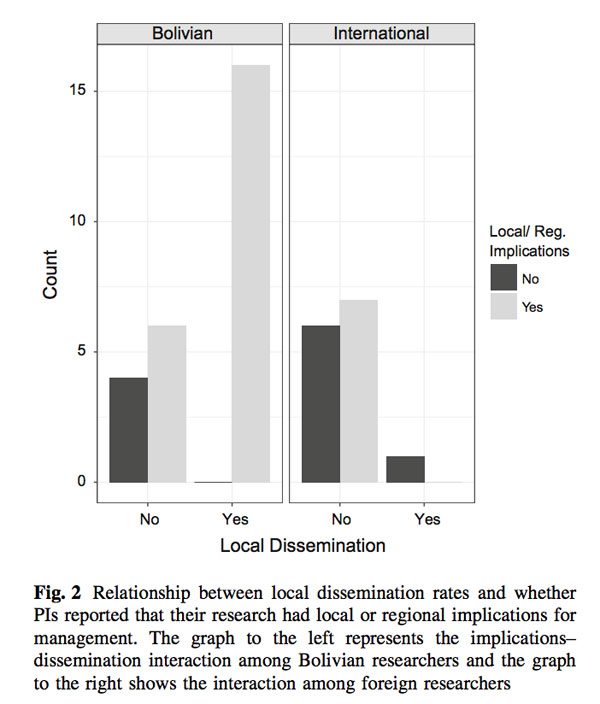
May 7, 2018; The Conversation
“Scientists are increasingly expected to produce research with impact that goes beyond the confines of academia,” writes Anne Toomey in The Conversation. “Perhaps nowhere is impact of greater importance than in my own fields of ecology and conservation science.”
Toomey notes, for example, that “research on an endangered plant can help to address the threats facing it.” But, Toomey adds, the “people who live and work in the places where the research is conducted may have different ideas about what impact means” than scientists do.
Toomey, working with Bolivian colleagues, studied perceptions of research and its impact in the Bolivian Amazon. Focusing on Bolivia’s Madidi National Park and Natural Area for Integrated Management “between 2012 and 2015, we carried out interviews and workshops with people living and working in the region, including park guards, indigenous community members and other researchers. We also surveyed scientists who had worked in the area during the previous 10 years.”
The results? Toomey and her colleagues found “foreign-based researchers had extremely low levels of local, regional or even national dissemination. However, they were more likely than national researchers to publish their findings in the international literature.”
As Toomey points out, “This disparity raises concerns about whether foreign-led research in tropical nations such as Bolivia is perpetuating colonial-era legacies of scientific extractivism,” a practice by which foreign researchers organize indigenous knowledge for elite consumption. As Toomey explains, the result is “a modern form of scientific colonialism—conducting fieldwork in a far-off land and then taking their data and knowledge home with them.”
Toomey points out that as recently as the 1990s, “more than 90 percent of 37,000 zoological specimens from Bolivia were in collections beyond its borders.”
Sign up for our free newsletters
Subscribe to NPQ's newsletters to have our top stories delivered directly to your inbox.
By signing up, you agree to our privacy policy and terms of use, and to receive messages from NPQ and our partners.
The locals, not surprisingly, come to see that “research is only for the researcher” and “researchers leave nothing behind.”
“In interviews and workshops,” Toomey recalls, “they lamented opportunities missed because they didn’t know about the results of research conducted on their lands. For example, when the park staff learned about previous research done on mercury levels in the Tuichi river that runs through the park, they talked about the importance of sharing this information with local communities for whom fish is a main source of protein.”
But how does one change those dynamics? One suggestion Toomey provides is “to think differently about what is meant by impact and when it takes place. Although it’s typically understood to occur after the results have been written up, our research found that the most meaningful forms of impact often took place prior to that.”
Toomey elaborates:
In ecological and conservation science research, locals are hired as guides or porters, and researchers often stay for days or weeks in communities while they are collecting data. This fieldwork period is filled with potential for knowledge exchange, where both parties can learn from one another. Indigenous communities in the Madidi region are directly dependent on local biodiversity. Not only does it provide food and other resources, but it’s vital for the continuation of their cultures. They possess unique knowledge about the place, and they have a vested interest in ensuring that the local biodiversity will continue to exist for many generations to come.
Rather than impact being addressed at the end of research, societal impacts can be part of the first stages of a study. For example, people living in the region where data is to be collected might have insight into the research questions being investigated; scientists need to build in time and plan ways to ask them. Ecological fieldwork presents many opportunities for knowledge exchange, new ideas and even friendships between different groups. Researchers can take steps to engage more directly with community life, such as by taking a few hours to teach local school kids about their research.
Or course, it is not just scientific research in ecological regions where such blindness occurs. Surely many NPQ readers can tell similar stories about health research done by white researchers in communities of color in the US, for instance. As Toomey writes, if impact is the goal, “non-academics need a bigger voice in the process of determining what those impacts may be.”—Steve Dubb













